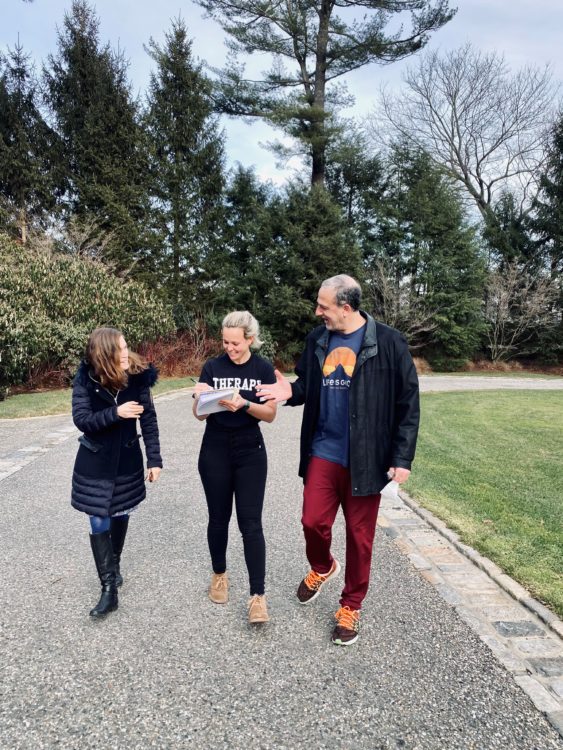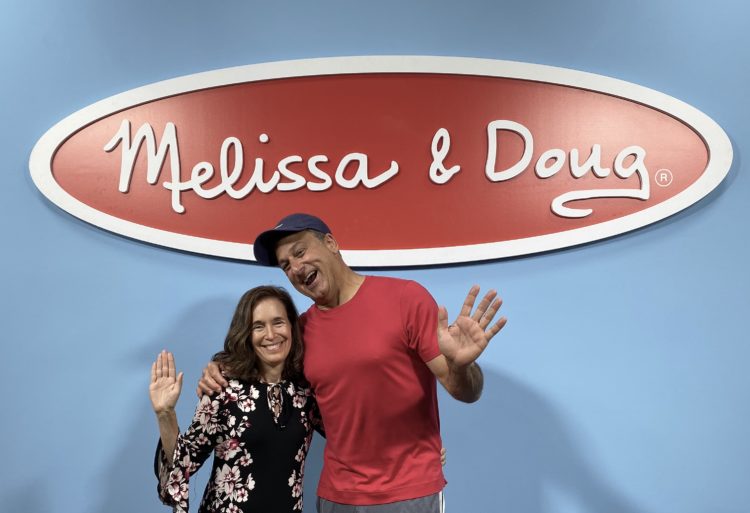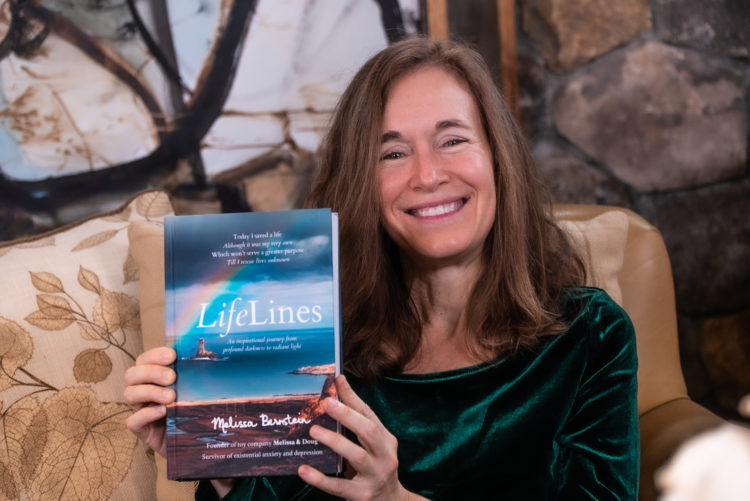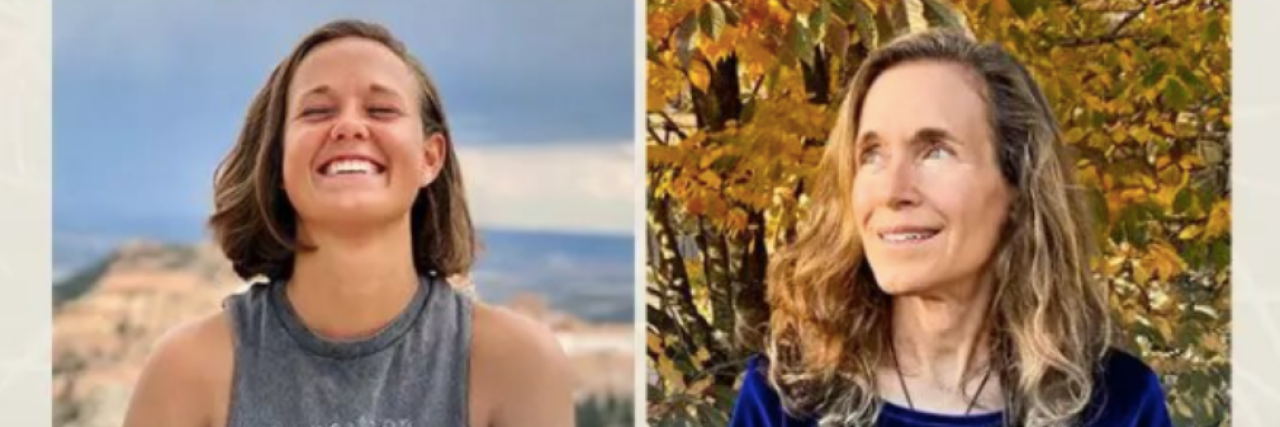Melissa and Doug Bernstein don’t know it yet, but in my late teens, I actually knew them well. I stumbled upon their successful toy company, Melissa & Doug, in an unconventional way. Ironically, I spent some of my darkest moments in close proximity to the seemingly joyful toy-making visionaries, parked beside their company headquarters to cry in solitude at night. I often stared at the company’s sign, wondering if Melissa and Doug were real people and what they were like. By sheer coincidence or no coincidence at all, I now work with them on Melissa’s latest venture, an online ecosystem for those who struggle with mental health and seek community. As I think back to how unbearably alone I felt then, I realize now just how close I was to someone who understood.
I had a powerful sense that Melissa and I would just get each other the first time I sat down on a couch beside her. While there are marked differences in the trajectory of our lives, there are also uncanny parallels. I timidly came forward with my story of mental anguish at age 21; Melissa did so in her early 50s. Melissa channeled her darkness into light through creating children’s toys; I channeled mine through writing, speaking and pursuing a master’s education in clinical social work where I supported patients who struggled with many of the same afflictions I struggled with. This work allowed me to reclaim some of the control I lost to my own mental illness by helping others through theirs.
Melissa, who battles with something called existential depression, has reclaimed her experience by publishing a memoir and cultivating a powerful community around collective awareness. My use of self-disclosure with patients—such as transparency about my own diagnoses—differentiated me from many in my field and was considered controversial by some of my peers. Melissa’s use of self-disclosure operates similarly, differentiating her from her peers and making her susceptible to scrutiny. Unfortunately, these sorts of displays of vulnerability, despite strengthening our communities and feeding the “collective soul,” are still considered taboo.
As we suffered in silence, both Melissa and I nearly lost our lives to eating disorders, and both of us considered suicide as an escape from our pain. We both spent years battling relentlessly against our authentic selves, and to this day, we both continue to be drawn toward darkness despite the way it has ravaged our lives. Melissa and I have both struggled profoundly to find meaning in a society that conditioned us to repress the reality of our suffering and to fill empty space with contrived activities. And, after years of this turmoil, we are both motivated to publicly embrace the full spectrum of our emotion and find meaning in our own chaos. We speak often about how, when you learn to live meaningfully and authentically, you “come home” to yourself. I believe wholeheartedly that, while neither of us knew it, our paths were meant to cross as we each set out to find our way home to ourselves.

It took me years to understand that my suffering was greater than what might be considered everyday ups-and-downs. Even in elementary school, when I was of just the right age to be playing with Melissa & Doug toys, I lived with a darkness I could not yet explain. It was the culmination of many dark experiences that landed me with the right care team. With tremendous support, I found my way out of crisis and became a friend to myself and my own best advocate. Surrounded by an immeasurably strong and resilient community, I eventually had the privilege of bringing my story to a broader stage.
In Melissa’s case, until she stumbled upon a book about existential depression, she was unable to recognize her own intense despair for what it was. For much of her life, something called existential nihilism immobilized Melissa, causing her to believe that her life had no intrinsic meaning. Melissa was consumed by doubt over her purpose and felt like an inconsequential part of the universe. Tormented, she repressed her truth and attempted to embody the qualities she believed would help her achieve the “perfect” image. She starved herself, denied herself relationships with those who failed to meet her rigid standards and engaged in self-sabotaging behaviors. Melissa experienced overexcitabilities, a heightened awareness, intensity and sensitivity to life that manifests in extreme stimulation of the central nervous system for extended periods of time. As she explains, “the beauty and pain of life are almost unbearable because you operate on such a “tuned up” level.
Overexcitabilities cause those with existential depression to experience a deep sense of unsettledness, and while the individuals are oftentimes prolifically creative, they may not respond to traditional treatment methods. Failing to recognize the magnitude of her suffering, Melissa never sought treatment, engaging instead in denial, repression, banishment and escapism. Until last year, she was not able to say, “I feel sad today,” and prior to seeking help, creating toys became her salvation. This form of creativity provided a means through which she could transform abject darkness into something radiant and cheerful. Stoic on the outside, Melissa recounts having an intense desire to kill herself every day and believes she likely would have lost her fight if not for creativity.

While Melissa’s survival was contingent on creativity, creativity also allowed her to avoid her authentic self by escaping into her imagination. That is, until she confronted the reality that she had a problem and that her problem had a name. The moment Melissa learned that her darkness could be attributed to something, she says, it literally “brought her to her knees.” This discovery gave her a new lease on life because she could finally begin to address her condition, work through unprocessed traumas and craft a new narrative. Through a lens of existentialism, she tells us, the onus is on the individual to make meaning; so, Melissa has come to see that sharing her creations with the world—including LifeLines—is the most important action she can take.
“When our creations don’t see light or get shared,” she says, “they remain shrouded in darkness to fester.”
While she is aware that her existential depression will never just go away, Melissa has learned to engage in practices that help her find meaning where she previously couldn’t. Through her new venture, LifeLines, Melissa hopes to inspire others to channel darkness into something meaningful, be it an authentic relationship with themselves, art or something else. LifeLines provides the resources needed to “journey inward,” a process fundamental to Melissa’s personal story of survival. To journey inward requires work, particularly in the form of unlearning judgment toward ourselves; but, Melissa now knows that her purpose, which she long struggled to see, is to make this exploration easier and more accessible to others. LifeLines is the antithesis of other wellness brands, which make false promises and inspire futile efforts by suggesting there is one concrete answer to our problems. Contrary to popular belief, many of the answers we so desperately seek can only be found within.

Melissa advocates for practices such as learning to be a witness to our own process, looking objectively on our highs and lows, and setting an intention to treat ourselves with kindness and compassion regardless of how extreme they may be. When I first met with Melissa, she said “be the sky. The sky observes the weather dispassionately, and when bad weather passes, it shines blue again.” It is a privilege to self-reflect and grow alongside Melissa, knowing the wisdom we share is a gift only darkness can afford. I am learning to differentiate between the moments I operate from my head—the less creative, more self-critical part of my psyche—and the moments I operate from my heart, the place where my soul and passions live. Creating more space between our heads and our hearts allows us to look objectively on our actions with intent to live more authentically. What makes Melissa different from others aspiring to change the world is that, whomever you are and whenever you are ready, she wants to be by your side. Melissa knows that one of the scariest parts of experiencing despair is it has an intimate relationship with loneliness and isolation. When we hide behind the “I’m fine” façade, we have no other choice but to contend with the darkness on our own. It is that time in history to begin “feeling everything,” she says.
In grad school, I was trained to identify mental health disorders and to treat them using evidence-based modalities. Existential depression is not listed in the DSM-V, the manual clinicians use when making a diagnosis. For all intents and purposes, if an affliction does not exist in public consciousness, it becomes invisible; the erasure of those with existential depression may have a devastating human toll.
Melissa’s decision to launch LifeLines came after she was forced to learn the hard way how difficult it is to get treatment if your condition does not even formally exist. Current scholarship suggests that taking a philosophical approach may be key to effectively treating existential depression. Those with existential depression may be at high risk for suicide because they demand a specialized sort of care that has yet to be realized or developed. Melissa is on a mission to disrupt the status quo—which in this case may have deadly consequences—and to ensure that every individual she encounters knows just how important they are.
Looking back on my deeply depressed teenage years, I now realize that Melissa and I were destined to meet under new circumstances. I am no longer an onlooker to a life I wholly misconstrued, but a part of her courageous mission. Melissa and I fought separately against what once felt like an immovable wall to stand together in the light today. After enduring immeasurable pain, we are ready to put our resilient minds together to make something beautiful of it. Our team is developing an interactive curriculum on topics that—because of stigma, shame and fear—have never been addressed. At LifeLines, our only motive is to stand beside you as you come home to yourself. Every healing practice, self-expression workshop and connection LifeLines has to offer comes from a place of knowing; we know the inner turmoil, the desperate cry for relief and the comfort of finding someone who understands our plight. We want you to know, we understand, and we are ready and proud to march beside you toward the light.
LifeLines.com launched on February 15, 2021.
Header image via Lifelines’ Facebook page. Other photos via contributor.

